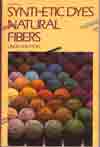I have a silk and guipure lace white wedding dress I would like to dye black to make into an evening gown
Name: Stephanie
—ADVERTISEMENTS—

Linda Knutson's book
Synthetic Dyes
for Natural Fibers
provides a thorough introduction to hand-dyeing
Country or region: Hertfordshire, England
Message: I have a silk and guipure lace white wedding dress I would like to dye black to make into an evening gown. Can you suggest what dye I should use or is there a place where I could get this professionally done?
Is your dress washable? Have you washed it yet? It seems likely that your guipure lace should not be washed, for fear of shrinkage and puckering of the lace. If a dress is not washable, then it simply cannot be dyed, either at home or commercially. For more on that, see my blog entry from August 18, 2011.
If your dress has been washed without any problems, then it might be dyeable, but the fact is that you will be taking some risk with this. A small but significant fraction of items will be ruined when you try to dye them; they may prove to be less sturdy than expected and fall apart in the wash, or it may turn out that one panel of fabric is different from the others and ends up taking a different amount of the dye, resulting in a noticeable difference in color. I recommend dyeing used or other non-PFD* clothing only if you can accept that there is some risk of a total loss.
Guipure lace is not made of silk, so it may not be easy to get a perfect color match between the dress and the silk. Different types of fibers typically produce slightly different hues with the same dye. Some guipure lace is made of 100% rayon (viscose rayon, not rayon acetate), and is therefore easily dyeable, though the silk may perhaps dye to a browner or bluer or more greenish shade of black than the rayon. Worse, some guipure lace contains a little polyester and nylon; without unpicking the lace from the silk before dyeing, nothing that is part polyester can be made to dye as dark a shade as the silk, since polyester requires more heat for dyeing than silk can be expected to survive.
If the dress is washable, and if the lace is 100% rayon instead of 10% polyester, then there are several possible choices of dyes. You might get good enough results by using several packets of an all-purpose dye (one packet is unlikely to produce a dark black) or by using Dylon Machine Dye, which contains a fiber reactive dye. (Dylong Machine Dye is available in the UK and the rest of Europe, but not in North America.) It's important to pre-wash the dress very thoroughly before attempting to dye it.
I can't tell you what professional dyers there may be in England, as none have ever written to me asking to be listed on my "Find a Custom Dyer" page, and nobody who's written to me has ever mentioned success with one. All of the custom dyers on my list are in the US or Canada.
(Please help support this web site. Thank you.)
Posted: Monday - November 14, 2011 at 09:30 AM
Follow this blog on twitter here.
- Top of this blog -
- FAQ -
- The Dye Forum -
- How to Tie Dye - How to Batik -
- Books - Toys - Plants -
More in this category:
- -
Total entries in this category:
Published On: Aug 29, 2012 02:49 PM